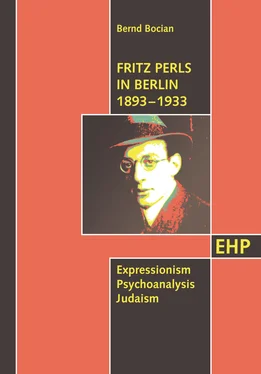Bernd Bocian - Fritz Perls in Berlin 1893 - 1933
Здесь есть возможность читать онлайн «Bernd Bocian - Fritz Perls in Berlin 1893 - 1933» — ознакомительный отрывок электронной книги совершенно бесплатно, а после прочтения отрывка купить полную версию. В некоторых случаях можно слушать аудио, скачать через торрент в формате fb2 и присутствует краткое содержание. Жанр: unrecognised, на английском языке. Описание произведения, (предисловие) а так же отзывы посетителей доступны на портале библиотеки ЛибКат.
- Название:Fritz Perls in Berlin 1893 - 1933
- Автор:
- Жанр:
- Год:неизвестен
- ISBN:нет данных
- Рейтинг книги:3 / 5. Голосов: 1
-
Избранное:Добавить в избранное
- Отзывы:
-
Ваша оценка:
- 60
- 1
- 2
- 3
- 4
- 5
Fritz Perls in Berlin 1893 - 1933: краткое содержание, описание и аннотация
Предлагаем к чтению аннотацию, описание, краткое содержание или предисловие (зависит от того, что написал сам автор книги «Fritz Perls in Berlin 1893 - 1933»). Если вы не нашли необходимую информацию о книге — напишите в комментариях, мы постараемся отыскать её.
Fritz Perls in Berlin 1893 - 1933 — читать онлайн ознакомительный отрывок
Ниже представлен текст книги, разбитый по страницам. Система сохранения места последней прочитанной страницы, позволяет с удобством читать онлайн бесплатно книгу «Fritz Perls in Berlin 1893 - 1933», без необходимости каждый раз заново искать на чём Вы остановились. Поставьте закладку, и сможете в любой момент перейти на страницу, на которой закончили чтение.
Интервал:
Закладка:
The wave of anti-Semitic sentiment against those who were »alien to the volk« reached its apogee in the Berlin Antisemitism Dispute of 1879-1881, with the diatribes of the Protestant court chaplain in Berlin, Adolf Stoecker, and the dispute between Berlin university professors Treitschke und Mommsen occupying central roles. The term anti-Semitism itself also belongs in this context. Coined in Berlin in 1879, it gained acceptance and was adopted by other European languages. In 1893, the year Perls was born, the »Centralverein der deutschen Staatsbürger jüdischen Glaubens« (Central Association of German Citizens of Jewish Faith) was founded as a countermeasure. It was the first time since their emancipation that Jews had entered the public arena to defend themselves against discrimination and stand up for their rights in an organization of their own. The Centralverein developed into the most important advocacy group for assimilated Jews, who were in the majority in the German Empire. The association’s core message was »We are not German Jews but rather German citizens of the Jewish faith. We are firmly grounded in German nationality. We have as much in common with Jews in other countries as German Catholics and Protestants have with Catholics and Protestants of other countries« (in Adler 1988, 117).
During the course of its history in exile, the Jewish people endured horrible suffering in all of the European countries. In Wilhelminian Germany, anti-Semitism was limited to verbal and written attacks, and for the most part did not pose an immediate personal threat to Jewish lives or property. Up until the end of the First World War, the point at which anti-Semitism was in a sense »rediscovered« (Battenberg 1990b, 232) as a political tool, the situation remained relatively calm. Attempts at violence were stifled immediately by the police, and the safety of Jewish citizens in the empire was protected. With respect to the period under discussion here, the last violent incidents had been the unrest in Pomerania in 1881, and German Jews took reassurance in the aversion of most middle class citizens against »rowdy antisemitism.« At the same time, however, the civilizing process that anti-Semitism underwent provided support for its acceptance at the higher levels of society. This was particularly true of the new pseudo-scientific form of »race science« that was emerging in Europe during these years, with strong German participation, and was based on traditional Christian anti-Semitism. Anti-Semitism penetrated into all of the upper classes and also into middle-class agricultural organizations and trade associations. Granted, it had not become a dominant politcal force, but it had bonded inseparably to nationalistic and imperialistic ideas as they spread. Thus, anti-Semitism had penetrated deep into the bourgeoisie and altered it.
When anti-Semitism in the Wilhelminian Empire is described as a movement within the educated and leadership levels of society, the reference is to the scope of its influence. This extended from the military caste, representing the very top of the prestige ladder, and reached far into other social groups such as teachers, students, university professors, and the Protestant clergy (see ibid., 32). As a »social code« (Vulkov 1994, 120), anti-Semitism belonged to the ideological core of the right-wing conservative and radical right-wing parties and organizations. The liberal and socialist party programs did not have an anti-Semitic orientation, which is why the political orientation of many Jews tended in this direction. If right-wing organizations had not fused inseparably with anti-Semitism, there would have been an influx of nationally minded Jewish Germans here as well, for they definitely did exist, occasionally even acting as leading figures in nationalistic and anti-Semitic organizations (see Hepp 1999, 283).
During the Wilhelminian years, anti-Semitism found no great resonance within the working classes. Yet the massive dissemination of propaganda and the incitement of the proletariat by the educated lower and upper middle classes, with the national chauvinistic sentiments they had adopted in the meantime, would come to fruition decades later. The German Social Democrats, who were Marxists at the time and the only party to consistently oppose anti-Semitism, were attractive – as was socialism in general – to the segment of the German Jews who hoped for social change. Important activists of Jewish origin included the social democratic politicians Ferdinand Lassalle and Eduard Bernstein, the later communists Rosa Luxemburg and Eugen Leviné, and the liberal socialists Kurt Eissler and Gustav Landauer. But these well known names must not obscure the fact that the majority of German Jews, much like the other Germans who were doing quite well, had a conservative political orientation and were not interested in socialistic change.
For Jews, although not for Jews alone, access to civil service positions was made difficult, for example, obtaining a university chair or making a career as an active military officer which entailed enormous prestige in Wilhelminian society. The fact that the barriers applied only to reaching such high positions is in itself quite an indication of the stage the integration process had already reached.
In the newly founded Germany, a major power that was dominated by Protestant Prussians, other parts of the population were also disadvantaged, such as women, Catholics, advocates of the long forbidden Social Democracy (the »fellows without a fatherland«), and other »Reichsfeinde« (enemies of the empire) like liberal leftists or the national Polish minority (see Heer 1997, 196 f.) Adding to the overall picture was the fact that the working masses were despised by the ruling elite, physically exploited, and worn ragged by capital owners of every origin and religious hue. At the same time, blue collar workers had been robbed of their political rights and influence to a large degree. This also shows clearly that in terms of the actual social conditions the class front line between exploiters and the exploited, between the rulers and the oppressed, were more decisive factors than any religious orientation or question of origin.
Within the social context of the times and in comparison to other countries, the situation in Germany overall was attractive for German Jews. Anti-Semitism was prevalent throughout Europe. Germany was no exception. 7There were strong anti-Semitic movements in Austria and in France, and in France they escalated within the framework of the Dreyfus affair in 1896. Many Jews experienced Eastern European and Austrian anti-Semitism as so threatening that they chose Germany as a transit location or often even as a place of escape.
In 1893, the year Friedrich Salomon Perls was born and the year the Centralverein was founded, there were 16 representatives of outspokenly anti-Semitic parties seated in the German Reichstag; 1893 was also the year that various nationalistic-imperialistic-anti-Semitic associations were founded. 8Nevertheless, the danger emanating from these organized anti-Semites was not perceived as an existential threat, and German Jews viewed their economic, legal, and cultural situation as reason for optimism.
Jewish authors from German-speaking countries write that the Jews loved Germany during these years (see Adler 1987, 158; Scholem 1995, 42). They were proud that, beginning with Moses Mendelsohn (1729-1786) and the Jewish Enlightenment, the so-called Berlin Haskalah, an exceptional emancipation had occurred and offered opportunities for social and economic advancement. Jews in Eastern Europe, the majority of whom spoke Yiddish which had emerged from a medieval Rhenish dialect, also viewed emancipation in Germany as their model and consequently oriented themselves to the German cultural tradition. Germany, and specifically the Berlin of Moses Mendelsohn, the city where erudite Jewesses such as Rahel Varnhagen and Henriette Herz hosted salons that gathered the philosophical and artistic elite of the times, held great attraction and formed the intellectual center of European-Jewish emancipation and assimilation. Affluent Jewish families in Eastern Europe sent their sons, and later also their daughters, to study at universities in Berlin. Yet even during the days of the empire, this was counterbalanced by the many significant and outstanding contributions of German Jews to the economy, science, and the arts, without which the great prestige and high recognition enjoyed by German accomplishments during the era might well not have come about (see, for example, Rürup 1995).
Читать дальшеИнтервал:
Закладка:
Похожие книги на «Fritz Perls in Berlin 1893 - 1933»
Представляем Вашему вниманию похожие книги на «Fritz Perls in Berlin 1893 - 1933» списком для выбора. Мы отобрали схожую по названию и смыслу литературу в надежде предоставить читателям больше вариантов отыскать новые, интересные, ещё непрочитанные произведения.
Обсуждение, отзывы о книге «Fritz Perls in Berlin 1893 - 1933» и просто собственные мнения читателей. Оставьте ваши комментарии, напишите, что Вы думаете о произведении, его смысле или главных героях. Укажите что конкретно понравилось, а что нет, и почему Вы так считаете.











